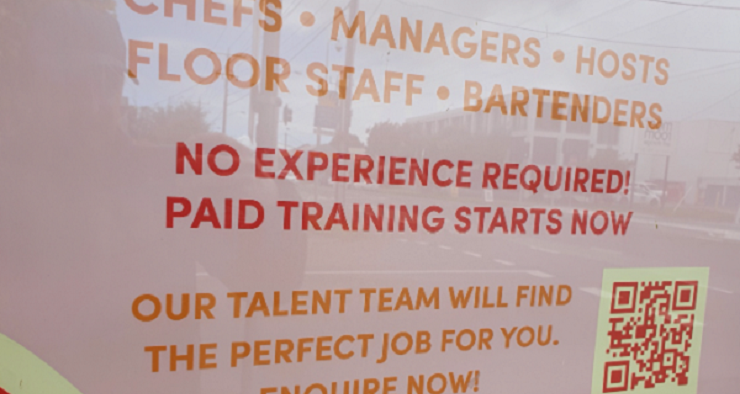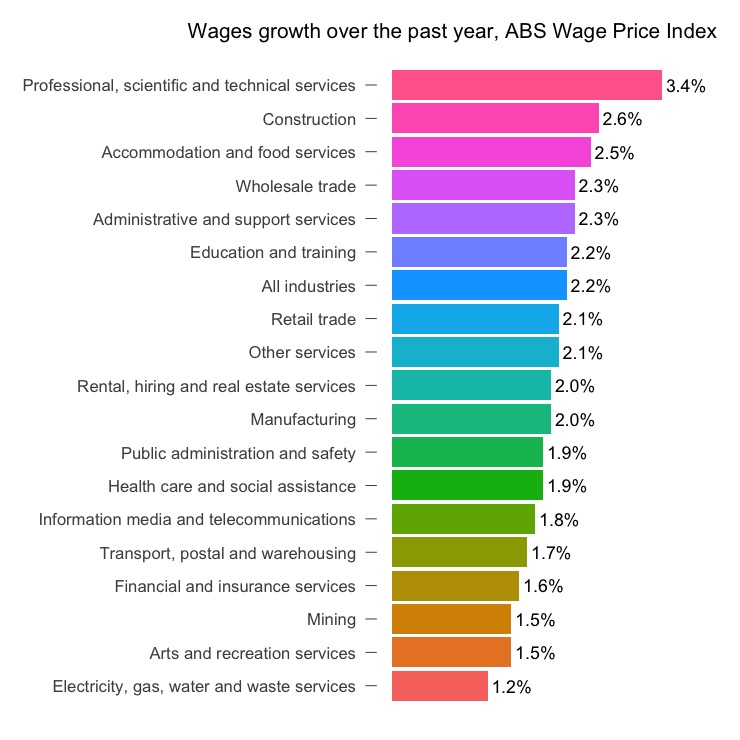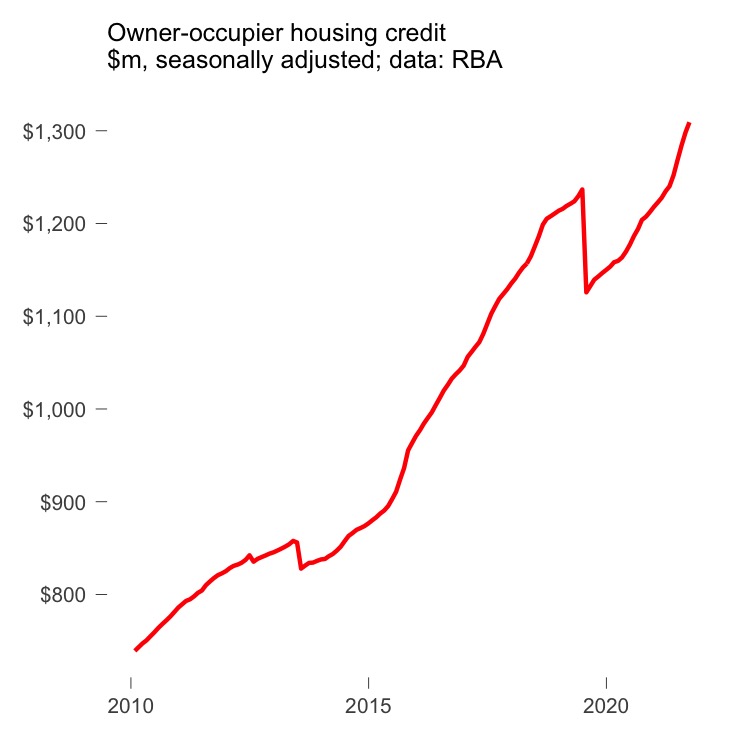
When I saw the above sign in the window of a local pub, I did a double take. Paid training? When did you last see a hospitality place offering paid training? And taking on staff with no experience! It’s unheard of!
It must be hard indeed for pubs to find staff right now, I thought. And then I followed the QR code on the sign and I was rocked on my heels — a $1000 bonus to staff who stay for three months? The Australian economy must be going rather better than I figured.
The employer in this case is a large hospitality company called the Australian Venue Co, which is hiring for work in its 150+ pubs located from Hobart to Darwin. They’ve actually made the news before for their desperate thirst for staff, after offering to pay to bring Aussies home if they were willing to work for the company:
“We’ll make moving home a breeze! Australian Venue Co will cover the cost of your:
- Flight to Australia
- Hotel quarantine
- 2 weeks of accommodation in your destination,”
proclaims their website.
The question of the future of the Australian labour market is vital, and even as we wait for the data to come in, the anecdotal evidence is piling up. And the data is starting to come in. The wage price index bumped up this past week, registering a healthy 0.9% lift in the three month period covering July, August and September. That’s a decent result for a period where half the country went into total lockdown.
And the evidence for the period after that is looking better and better.
The migration angle
Of course, the hospitality industry may be seeing a stronger lift in wages than other industries, as it has long had a reliance on temporary migrants to do a lot of the potato peeling and pint pouring. Now that pubs and cafes are stuck trying to recruit Aussies, they are probably finding the recruitment game a lot tougher. So it is no surprise to see the hospitality industry near the top of the list of recent wage rises. In the next chart, hospitality comes in third, behind only white-collar industries and construction.

We should touch on the debate over whether migration can have an economy-wide effect on wages. The evidence tends to show that it does not, over reasonable time frames. The extra demand added to the economy works alongside the added supply of labour such that adding migrants can be good for wages and the economy overall. Feelings, however, run in the opposite direction to evidence.
And, when even the RBA governor has stuck his oar in to muddle the waters, you’d be mad to bet on evidence carrying the day.
Yes, Josh Frydenberg has signalled 200,000 migrants will be allowed to enter the economy, to “accelerate our economic recovery by helping to address shortages in our labour market and allowing businesses to expand and grow with confidence”. But that is probably just testing the water. NSW Premier Dominic Perrottet wants 2 million migrants and I suspect the idea will be far less popular than his plan to end lockdowns.
Inflation and house prices
If wages rise, as they seem to be finally be doing after years in the doldrums, will that flow through to inflation? The RBA says yes, but only slowly. It expects limited wages growth until 2023, and therefore does not anticipate major inflation pressures until after that time. When the RBA does sense inflation is back for real, it expects to raise interest rates from their current record lows of 0.1%.
The idea is that as the economy grows happily, price pressures bubble along but are contained by interest rate rises. The rate rises need to be big enough to clamp down on inflation but not so big they harm that happy growth.
It’s an awfully narrow aperture to sail through. Especially when you consider the amazing leverage the Australian economy has taken on in recent times. Housing credit has risen 6.5% in the last year. Even as owner-occupiers pay off loans with interest rates at record low, new borrowers are adding to the stock of housing debt via enormous mortgages. Any future rise in interest rates will have an extra-large effect, and any wobble in house prices could do harm to homeowner confidence.

All of which is to say – getting some decent wage rises in the next few years might be the easy part. Keeping them flowing in an extremely fraught macroeconomic environment is the big challenge.








Interesting for now, but… what is missed in Australia is the global context i.e. ageing workforces and increasing dependency ratios, thinned out (permanent) population pyramids etc. backgrounded by contrary narratives in Australian media informed by for decades by ‘Australia’s best demographer’, UNPD global data, ‘nebulous’ NOM Net Overseas Migration (UNPD defined, expand and inflated in 2006 but unnoticed by media).
The latter is misrepresented as (undefined) ‘immigration’, when it’s more Malthusian eugenics based obsessions about headline immigration and population growth numbers (for media headlines) to avoid regulatory constraints on fossil fuels, corporate sector and workplaces e.g. environment, unions, wage awards, regulatory compliance etc.
However, if one uses the more reliable OECD working age population data for global comparison i.e. parse out temporary residents e.g. international students caught under equivalent of the NOM, and only focus upon the long term permanent population, the picture is very different.
If using OECD data then Australia’s situation is not unique i.e. all nations’ workforces are on the cusp of or already ageing and declining with low fertility generations following….most have peaked at 59-66% working age, with Australia’s level high along with Germany, Canada etc. (all with significant growth in retirees/pensioners).
In other words younger generations need to be patient, be skilled in something and join a union if possible as the baby boomer bubble rolls out of the workforce (other warning, out of homeownership too impacting asset prices); otherwise you will be thrown under a bus, but many will use old eugenics tropes e.g. blamed on ‘immigrants’ and/or unionised workforces.
Good points but for the Coalition and their supporters the solutions to low fertility, not wanting to spend money on training, keeping wages low and creating “growth” are all answered by high immigration. In the long run this will likely come unstuck but in the long run we are all dead. Too much patience needed to wait that long run out. The Coalition focus is the next election cycle, that’s as high as the vision goes.
We are indeed fortunate to have our very own correspondent “in touch with the working class” bringing despatches from the Underworld.
If you really wanted wages to rise you would strengthen people’s rights to collectively bargain. It’s not by accident that a central plank of the Coalition, business and commercial media has been to tear that right down. It was also not by by accident that both the economy and improved living standards grew through the 20th C on the back of rising wages coming from this and it’s institutional child, arbitration. Steady rises that forced an otherwise lazy and cosy set of oligopolies, largely free of meaningful competition, to invest and innovate to maintain profits. Since Hawke and Keating gifted breaches in the system to business in the eighties, things have eroded. Once the Libs came to power, wages began to stagnate and profit’s share of GDP grew steadily relative to wages. It is all more complex than just this but this is a key dynamic.
The Libs of course still claim the sky would fall in if this happens and continue to try to eradicate any vestige of unions that remain. Labor remains loyal to its 1980s switch to business and neo-liberalism, so it won’t act in this area either.
the problem is that wages being so low for the low to middle income people that the demand for goods and services for hospitality, retail, tourism,e.c.t is low as they can not afford to spend monies as stated in this report msn.com/en-au/news/australia/we-need-to-be-alarmed-food-banks-in-overdrive-as-politicians-allow-australians-to-go-hungry/ar-AAQWI4n?ocid=hplocalnews&li=AAgfYrC&fbclid=IwAR0jzvgaPW4gGECrSdxl2WxdVyKm1j-pTlbaFvCODvr7KIBRd1BtHgtV1qA that more are turning to charity to make ends meet, so the monies start to dry up with day to day expenses, the flow on effect is reduced profits.
That’s it, have a good sook.
Land tax, wealth tax & inheritance tax.
On this point I completely agree with you, why feed the dragon, you are quite a contradiction. It will mean that overseas holidays will become more expensive ,but tourists will love it here. Actually I am having difficulty comprehending the effect of turning our economic backs on ever increasing costs and wages .
If wages and conditions are so good why can’t you get anyone? It quite simply doesn’t add up. Using the dole bludger label shows where you’re coming from. Hospitality socks, ask anyone.
Sorry, but the influx of student/migrant workers serves to depress wages. This has been most noticeable in the agricultural sector. The other problem besetting hospitality is underemployment rather than wage levels purely.
Your solution of punishing the person that accepts lower wages is surprisingly poorly thought out.
There are penalties for paying less than award, 7/11, woolworths, etc.